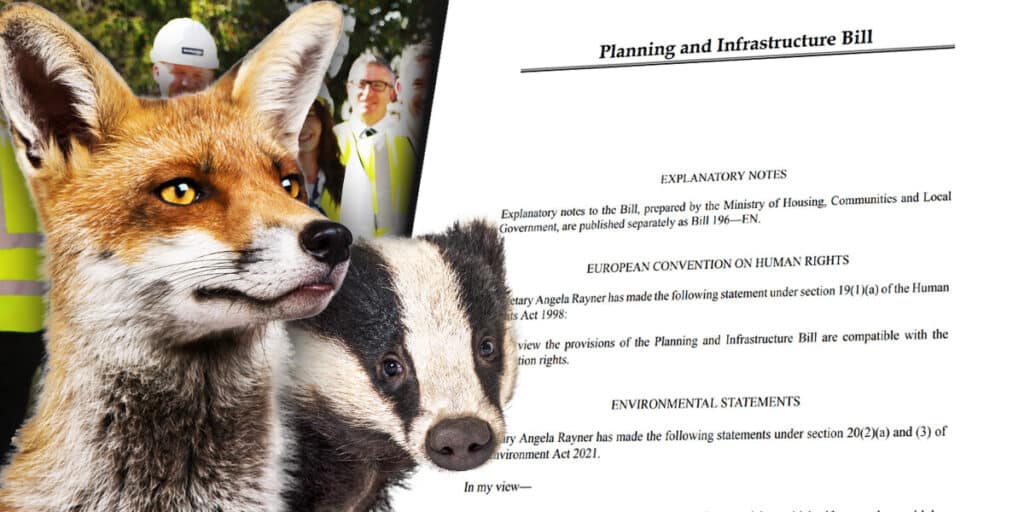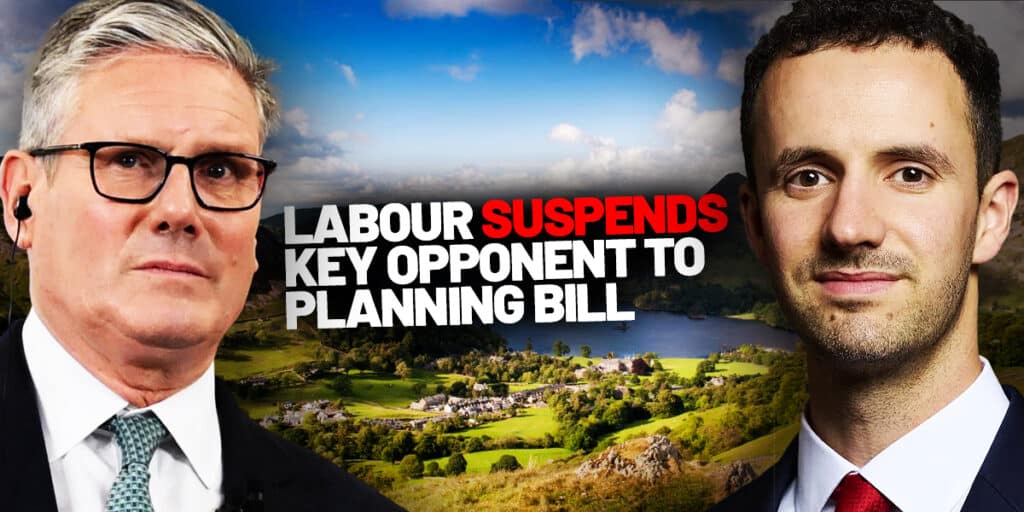The Labour Party is currently steamrolling through its Planning and Infrastructure (PI) Bill (which will strip away many of the remaining environmental protections from the UK’s precious wild regions).
The party recently suspended North East Hertfordshire MP Chris Hinchliff after he dared to oppose the government’s plans. Hinchliff has been a consistent critic of the PI Bill. He was suspended by Kier Starmer alongside three other MPs on 16 July for opposing the party’s controversial welfare reforms and persistently opposing the government.
Daring to challenge Labour’s ‘Pay to trash’ policy
Hinchliff proposed amendments to the PI Bill, which would have required Natural England – the body that will be tasked with enforcing the new planning regime – to ensure that developers have to adhere to Environmental Delivery Plans (EDPs). These “include a schedule setting out the timetable for the implementation of each conservation measure and for the reporting of results” and that where Natural England believes that the development is likely to cause significant environmental harm, then “the corresponding conservation measures” should ” result in an improvement in the conservation status of the identified features prior to the damage being caused” (emphasis added).
Hinchliff’s proposals were supported by eight Labour MPS, one independent and two Green MPs. They were debated but voted down in parliament.
His proposals were a direct attempt to limit the destructive impacts of Labour’s ‘pay to trash’ plans, which would allow corporate developers to make a one-off payment into a Nature Restoration Fund to offset the environmental destruction that their developments will cause.
Crucially – in Labour’s vision – the payments into the fund would not have to be spent on restoring the habitats that a specific development will destroy.
Basically, Labour’s plans would allow corporations to destroy precious ecosystems in return for planting some trees elsewhere in the UK. The Bill as it stands would also allow developers to carry out destructive construction projects in protected areas such as Sites of Special Scientific Interest (SSSIs).

Ripping up environmental protections
Hinchliff told the ENDs Report that he had tried to raise issues with planning minister Matthew Pennycook when the Bill was at the report stage. He requested a meeting to discuss his concerns, but his request was turned down.
He published a public statement on his reasons for proposing amendments to the Bill, writing on his website:
“The Planning and Infrastructure Bill gets it badly wrong, handing more power to profit-driven developers, rather than cracking down on their failures. Instead of demanding results, it rips up environmental protections and weakens local democracy, rewarding failure at the expense of people and nature.
Slashing so-called red tape in the hope the market will deliver is a political cul-de-sac. It won’t build the homes we need, and, in a few years, the developer lobby will be back for more, demanding another round of deregulation: a little less democracy, a few more habitats destroyed, and then, they will no doubt promise, the homes will come.”
Labour is hell bent on pushing through this bill

The Planning and Infrastructure Bill is being sold by Labour as a measure intended to allow the construction of more housing for poor people. However, in truth it is blatantly aimed at removing the few remaining obstacles to corporations that want to treat the UK’s remaining natural treasures as commodities.
Last month, Protect the Wild published ‘Five Reasons; why this Bill is bad news for nature. We detailed how the proposed measures will remove environmental protections from vital habitats for Nightingales, wading birds like Black-tailed Godwits and Spoonbills, Turtle Doves, and Badgers, as well as rare plants including orchids.
Hinchliff isn’t the only opponent of the government’s plans. Back in April, a group of ecologists, economists and government advisers signed an open letter urging Labour to cut damaging sections from the Bill. They wrote:
“The nature levy [offset scheme] is not a tool for ecological recovery: it is a licence to kill nature, with no evidence to suggest this would in any way help our economy”.
In fact, even Natural England head Tony Juniper says that many of the government’s claims being used to justify the Bill were “not necessarily fully backed by evidence”
Labour makes a small concession
About 24 hours after Hinchliff’s suspension, Labour proposed a package of amendments to the Bill in an attempt to placate dissenters. The changes will – amongst other things – require that timelines for environmental protection measures are published as part of agreeing new infrastructure plans.
Joan Edwards, director of policy and public affairs at The Wildlife Trusts charity, responded to the amendments:
“This must mark the start of Ministers listening more to the nature-loving British public and recognising that wilder places mean happier, more secure and more prosperous futures for all.”
Edwards promised that The Wildlife Trusts would “scrutinise” the changes to the Bill.
Protect the Wild’s Rob Pownall commented on Hinchliff’s dismissal and the government’s concession:
“So let me get this straight… You suspend him for standing up for nature then quietly admit he was right all along?! It’s outrageous. This isn’t just political backstabbing, it’s a warning shot to anyone who dares put the environment before party loyalty.We need more MPs like Chris Hinchliff, not fewer.”
In truth, the vast majority of MPs never dare to fall out of step with their party.
The handy database ‘They Work For You’ compiles info on MPs’ parliamentary voting records and compares them to how other members of their party vote. A quick look at these records shows that most MPs vote with their party at least 95% of the time. Strict discipline is maintained by the parliamentary whips, who are MPs or Lords appointed by each party to make sure the maximum number of their party members vote – and do so the way their party wants.
Being out of step with their party can lose an MP the whip (as recently happened to Hinchliff, Rachel Maskell et al) and even be a career-ending move.

Sign our petition
Protect the Wild’s position is that Labour’s proposed changes to the PI Bill are nowhere near enough. That’s why we are continuing to gather signatures for our petition calling on Secretary of State Steve Reed to scrap the Bill. It reads:
“The UK is already facing a biodiversity emergency. One in seven species is at risk of extinction, and 41% are in decline. Yet this Bill weakens local environmental protections and turns nature conservation into a pay-to-destroy scheme. Developers will be given a green light to bulldoze through fragile ecosystems for short-term gain, with no obligation to repair the damage where it occurs.”
Please sign the petition here, and organise to oppose the Planning and Infrastructure Bill. If we want to prevent these damaging changes to the planning system, then we need to keep on making a noise about it
-
Check out our ‘Five reasons the Planning and Infrastructure bill will be disastrous for British wildlife’
-
You can read the text of the Planning and Infrastructure Bill on the Gov.UK website here and take a look at Chris Hinchliff’s proposed amendments.
Image of Chris Hinchliff via Roger Harris/Wikimedia Commons. Badger in woodland, via Vincent Van Zalinge/Unsplash. Black-tailed Godwit via Wikimedia Commons

